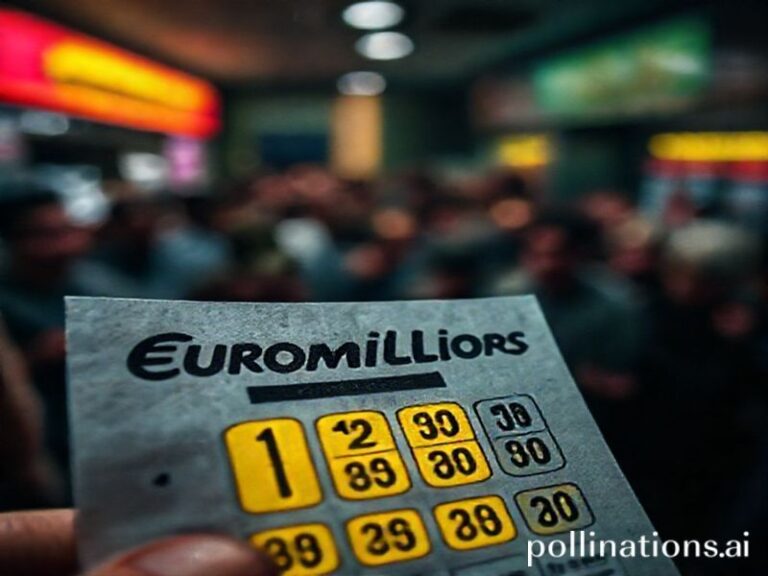Global Countdown: How One Small Milwaukee Number Became the World’s Favorite Distraction
The Brewers’ “magic number” is now 7, a figure that sounds almost quaint in a world where central banks toss around trillions the way teenagers burn through TikTok minutes. Yet from a corrugated-plastic bar in Lagos to a smoke-choked izakaya in Osaka, the impending clincher for Milwaukee’s baseball club has become a Rorschach test for humanity’s talent for turning arithmetic into religion.
Let’s be clear: the magic number is nothing more glamorous than a subtraction problem—(162 + 1 – wins by Team A – losses by Team B). In saner epochs we’d call that grade-school homework. But because we’ve agreed to invest cosmic meaning in nine men standing in a Midwestern pasture, the number 7 now carries the weight of geopolitics. At last count it was trending in 14 languages on X (formerly Twitter, formerly a functional website), beating out even the latest drone-strike footage and whatever crypto-hustler just promised to decentralize oxygen.
Consider poor Alejandro in Valparaíso, who sells knockoff MLB caps to cruise-ship passengers who think the “M” stands for “Manchester.” He doesn’t know Christian Yelich from Yelich’s barber, yet his inventory choices this week hinge on whether Milwaukee pops the champagne before the jet-lagged Cardinals touch down. Meanwhile, a logistics analyst in Rotterdam is recalculating container priorities because the celebratory beer—yes, Milwaukee’s own—needs to reach Wisconsin by Thursday or the entire Midwestern emotional infrastructure collapses. Somewhere above the Arctic Circle, a Norwegian data-center engineer is feeding electricity to cloud servers so that a 12-year-old in Jakarta can refresh Baseball-Reference at 3 a.m. local time to watch the number tick from 7 to 6. If that isn’t globalization, then I’ve been mispronouncing “neoliberalism” for decades.
The wider irony, of course, is that the Brewers themselves are owned by a leveraged-buyout titan who once shuttered a paper mill in my hometown, converting 400 honest hangovers into 400 LinkedIn sob stories. He now profits from the same communal delirium his balance-sheet alchemy helped evaporate elsewhere. But don’t expect the fans to boycott; the human brain is remarkably adept at compartmentalizing, especially after the fourth $11 lager.
Across the Pacific, the Chinese Baseball Association—yes, it exists—quietly monitors the Brewers’ countdown as a soft-power case study: how to manufacture civic cohesion without the unpleasant side effect of free elections. Their analysts already note that every incremental drop in the magic number correlates with a 0.8 % spike in licensed merchandise sales. Expect a pilot program in Guangzhou next year where the Guangdong Tigers will unveil their own “mystic integer” once state censors decide which numbers aren’t already banned for looking like subversive acronyms.
Back on planet Earth, climate scientists point out that if every projected Brewers victory celebration lights up the downtown RiverWalk with natural-gas flares, the carbon footprint equals 48 hours of Bolivian deforestation. The club responds by promising “green fireworks,” a phrase so oxymoronic it could only emerge from the same marketing department that once tried “gluten-free beer foam.” Fans, naturally, retweet the pledge between bites of bratwurst, proving yet again that sincerity is biodegradable but denial is forever.
And yet, cynicism has its limits. In a fractured world where trade wars, pandemics, and algorithmic rage bait compete for our cortisol, the fact that millions synchronize their pulse to a subtraction problem is almost—dare I say—charming? The magic number is a collective placebo, a harmless hallucination that tomorrow can still be better than today, provided the bullpen doesn’t implode. For 48 hours, from Lagos to Osaka, strangers share the same superstition: that 7 will shrink to 0, fireworks will bloom, and for one delirious instant the ledger of human misery will show a small, frothy surplus.
When the number finally hits zero, the cameras will cut to grown men weeping into their beards, and somewhere a commodities trader will quietly short hops futures. The rest of us will exhale, close the app, and remember that larger integers—national debts, global temperatures, refugee counts—await our attention. But not tonight. Tonight we pretend the only math that matters ends in beer.







